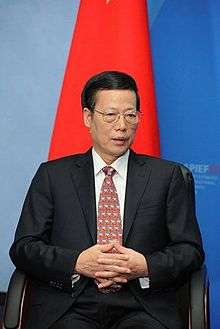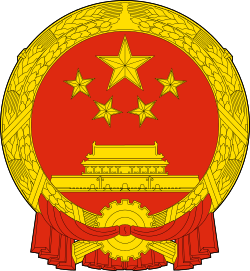Zhang Gaoli
| Zhang Gaoli | |
|---|---|
| 张高丽 | |
 | |
| First-ranked Vice Premier of the People's Republic of China | |
|
Assumed office 15 March 2013 | |
| Premier | Li Keqiang |
| Preceded by | Li Keqiang |
| Communist Party Secretary of Tianjin | |
|
In office November 2007 – October 2012 | |
| Preceded by | Zhang Lichang |
| Succeeded by | Sun Chunlan |
| Communist Party Secretary of Shandong | |
|
In office November 2002 – March 2007 | |
| Preceded by | Wu Guanzheng |
| Succeeded by | Li Jianguo |
| Personal details | |
| Born |
November 1946 (age 70) Jinjiang County, Fujian, China |
| Political party | Communist Party |
| Alma mater | Xiamen University |
|
Central institution membership
Leading group posts
| |
| Zhang Gaoli | |||||||||||||||
| Simplified Chinese | 张高丽 | ||||||||||||||
|---|---|---|---|---|---|---|---|---|---|---|---|---|---|---|---|
| Traditional Chinese | 張高麗 | ||||||||||||||
| |||||||||||||||
Zhang Gaoli (born November 1946) is the current first-ranked Vice Premier of the People's Republic of China and a member of the Politburo Standing Committee of the Communist Party of China, China's highest ruling council. Prior to his ascendancy to the pinnacle of political power in China, Zhang served as the Communist Party Secretary of Tianjin between 2007 and 2012, and the Party Secretary in the economic powerhouse of Shandong province between 2002 and 2007.
As Premier Li Keqiang's principal lieutenant, Zhang's portfolio spans the fields of finance, economic development, natural resources, the environment, and housing. He is the chair of ad-hoc steering committees overseeing the Three Gorges Dam, the South–North Water Transfer Project, One Belt One Road, and the Commission on Food Safety of the State Council.
Life and career
Early life
Zhang was born in a village in Jinjiang County, Fujian, to an ordinary family of farmers.[1] He was the youngest of five children. His family was poor. His father died when he was three years old.[2] He and his four siblings were raised almost single-handedly by his mother. As a child, Zhang helped his family with farm work and also caught fish in a neighboring river.[2]
Zhang attended Jinjiang Qiaosheng High School (晋江侨声中学). In 1965, Zhang entered Xiamen University to study economics. After graduating in August 1970, Zhang was sent to an oil company logistics team in Maoming to work as a labourer, stocking materials in a warehouse and moving concrete blocks.[3] He joined the Communist Party of China in November 1973. He spent nearly 14 years in the state-owned company, eventually becoming very involved in the company's Communist Party branch. By 1984, he was made a manager in the company.
Guangdong
In 1984, Zhang was named deputy party chief of Maoming. This was Zhang's first foray into politics. A year later he was named chair of the Guangdong Economic Commission. By 1988, he became Vice Governor of Guangdong. In 1993, at age 47, he made it onto the provincial Party Standing Committee, becoming one of the top leaders of the province. He also served in roles such as the head of the coordination agency in charge of developing the Pearl River Delta and also the head of the provincial planning agency.
In 1997, Zhang became party chief of Shenzhen. By the fall of that year he was named an alternate member to the 15th Central Committee of the Communist Party of China. In 1998, he was made deputy provincial party chief of Guangdong while holding onto his municipal leadership position in Shenzhen. He served under then-provincial party chief Li Changchun and alongside executive vice governor Wang Qishan. During this time it was said that he received praise from Jiang Zemin.[4] He was also said to have frequently visited and tended to the needs of party veteran Xi Zhongxun, the father of Xi Jinping.[4] In 1999 Zhang was named a visiting professor of macroeconomics at the prestigious Tsinghua University and also an honorary president and professor at his alma mater Xiamen University.
Shandong and Tianjin
In late 2001, Zhang was transferred to the eastern coastal province of Shandong to become Governor. He began serving as provincial party chief, the first-in-charge of the province, beginning in 2002. In Shandong, Zhang told a gathering of assembled local officials, "whether it is my relatives, children, friends; if they go to where you are, please do not go out of your way to receive them, do not curry favour with them, and do not offer to do things for them." This was seen as Zhang trying to send a signal that he intended to distance himself from a political culture rife with corruption and complex rules around guanxi.[2] In Shandong, Zhang was known to conduct 'undercover visits' to survey the lives of ordinary people. When Zhang left office, Shandong's GDP had exceeded 2 trillion yuan (~$300 billion), ranking second among provinces in the country.
Shortly after the 17th Party Congress held in October 2007, the central leadership moved Zhang in a provincial leadership reshuffle to become party chief in the coastal city of Tianjin. As the party leader of a direct-controlled municipality, Zhang also gained a seat on the Politburo of the Communist Party of China. Observers speculated that Zhang would become a member of the "fifth generation" of leadership. In Tianjin Zhang cultivated a low-profile image. While he was seen as a top contender for a seat on the Politburo Standing Committee, along with the regional chiefs of Chongqing and Guangdong, Bo Xilai, and Wang Yang, respectively, Zhang was decidedly less showy and avoided self-promotion. His motto during his term in Tianjin was "do more, speak less."[5]
Politburo Standing Committee
At the 18th National Congress of the Communist Party of China in 2012, Zhang earned a seat on the Politburo Standing Committee, China's de facto top ruling council. He was ranked seventh out of seven members. The council had shrunk from nine seats to seven seats at the 18th Party Congress.
On 15 March 2013, at the 2013 National People's Congress, Zhang was appointed Vice Premier, first in rank, to the cabinet led by Premier Li Keqiang.[6] He was put in charge of two mega projects, the Three Gorges Dam project, and the South-North Water Transfer Project. He was also named head of the Commission on Food Safety of the State Council. In February 2015, he was named leader of the Leading Group for Advancing the Development of One Belt One Road. He was also named the leader of the Leading Group for Coordinating the Joint Development of the Beijing-Tianjin-Hebei Region, the leader of the Leading Group for Advancing the Development of the Yangtze River Delta, and in April 2015, the leader of the Leading Group for the Transformation of the State Council. He is also the deputy leader of the Central Leading Group for Comprehensively Deepening Reforms and a member of the Leading Group for Financial and Economic Affairs.[7] He is also the Vice Chairman of the National Energy Commission. Zhang's wide ranging leadership roles made him a major force in the implementation of the so-called "New Normal" economic policies of Xi Jinping and Li Keqiang.[7]
Family
Zhang is married to Kang Jie (康洁), whom he met while working in the oil company in Maoming. They have one son, born c. 1989, who was, as of 2013, serving in the army as a junior officer. He also has an adopted daughter Zhang Xiaoyan (张晓燕), who was the biological daughter of his cousin. According to Hong Kong-based Apple Daily and Takungpao, Zhang Xiaoyan is married to Li Shengpo (李圣泼), the son of Hong Kong businessman Li Xianyi of Xinyi Glass.
Fujian-based website Straight Consume once published an article that alleged that Zhang's eldest brother had left China and died fighting as part of an insurrection against the government of the Philippines sometime in the 1960s. According to online sources in Fujian, Zhang was said to have cut most ties with his siblings after he ascended to higher positions in the world of politics. When serving in Shenzhen, his elder brother visited him but he was said to have told his brother that he was too busy to see him.[8] State media curiously made no mention of Zhang Xiaoyan while profiling the families of each of the members of the Politburo Standing Committee in 2013, suggesting that Zhang may not want to emphasize any connections he may have with a Hong Kong tycoon.[8]
References
- ↑ Cheng Li. "Zhang Gaoli 张高丽 One of China's Top Future Leaders to Watch". Brookings Institution.
- 1 2 3 "哪位常委文革遭遇不公平待遇 大学毕业被分配扛水泥". Ifeng. December 29, 2013.
- ↑ "张高丽大学毕业被分配扛水泥" (in Chinese). Ifeng. December 28, 2013.
- 1 2 "張高麗攀習近平" (in Chinese). 苹果日报. November 4, 2012.
- ↑ Li, Cheng (2012). "The Battle for China's Top Nine Leadership Posts" (PDF). The Washington Quarterly (35:1).
- ↑ "Who's Who in China's New Government Leadership Lineup". Bloomberg. 16 March 2013. Retrieved 16 March 2013.
- 1 2 Takungpao. April 21, 2015 http://news.takungpao.com/mainland/topnews/2015-04/2978714.html. Missing or empty
|title=(help) - 1 2 "官媒披张高丽资料刻意不提养女[图]". Duowei News. March 18, 2013.
External links
| Wikimedia Commons has media related to Zhang Gaoli. |
| Political offices | ||
|---|---|---|
| Preceded by Li Chunting |
Governor of Shandong 2001 – 2003 |
Succeeded by Han Yuqun |
| Preceded by Han Xikai |
Chairperson of People's Congress of Shandong 2003 – 2007 |
Succeeded by Li Jianguo |
| Preceded by Li Keqiang |
First-ranked Vice Premier of the People's Republic of China 2013 – present |
Incumbent |
| Party political offices | ||
| Preceded by Wu Guanzheng |
Communist Party Secretary of Shandong 2002 – 2007 |
Succeeded by Li Jianguo |
| Preceded by Zhang Lichang |
Communist Party Secretary of Tianjin 2007 – 2012 |
Succeeded by Sun Chunlan |

